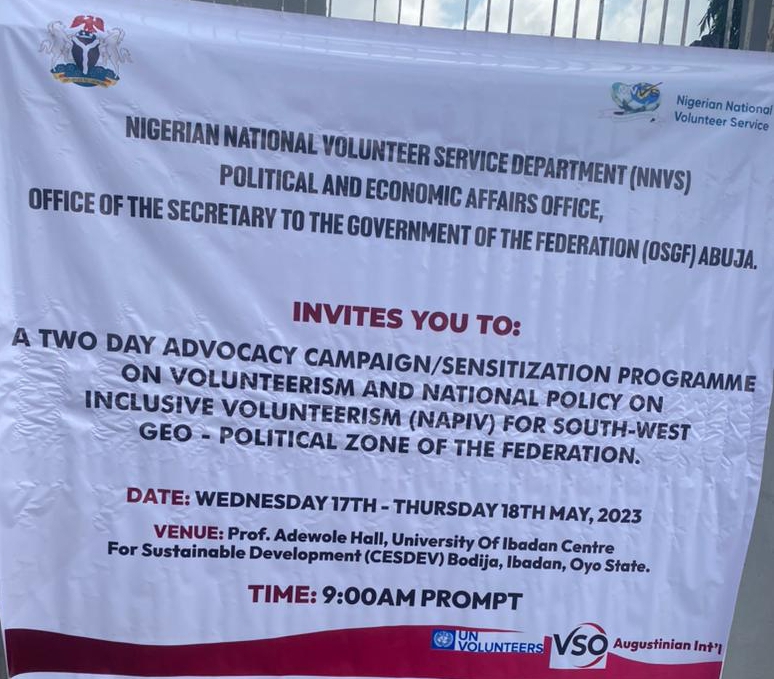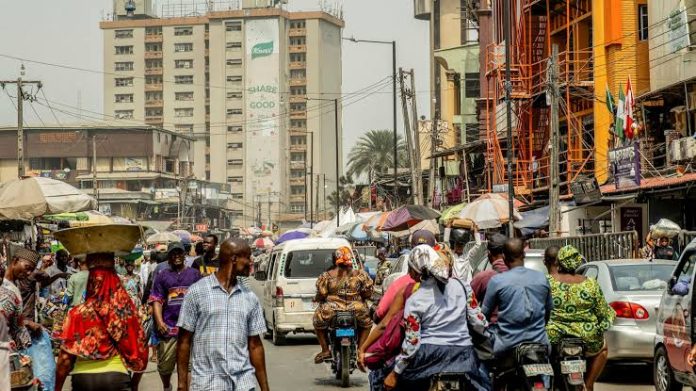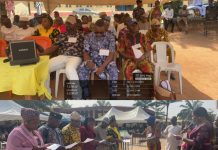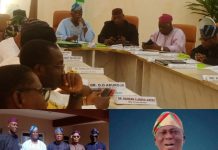
By Aminat Adedoja, Ibadan.
The Nigeria National Volunteering Service (NNVS), office of the secretary to the government of the federation (OSGF), has organized a two day Advocacy campaign/sensitization program on volunteerism and national policy on inclusive volunteerism (NAPIV).
The sensitisation programme tagged volunteerism and national policy on inclusive volunteerism for South-West Zone of the Federation, was held in Ibadan last week.

Delivering a paper on “The Role of Volunteerism in National Development”, a Don from the Department of History, University of Ibadan, Prof. Olaniyi Rasheed stressed that volunteers and community service are relevant to societal development.
According to him, government alone cannot solve every societal problems and the people must also be involved.
He said youths and community members can volunteer for community and national development through advocacy, donorship, expressiveness, skill-based, service to others, training of others and so on.
He identified that volunteers can engage in community sanitation, health care provisions, sports development, training programs for children and youths, skill acquisition programmes for women and youths and other social service activities.
He noted that corruption, sit-tight syndrome, diversion of grants for personal use, people’s distrust for government, and lack of policy prioritisation and sustainability of programmes, illiteracy and security among challenges facing volunteerism in Nigeria.
Prof. Rasheed recommended proper funding, effective coordination, inter-agency coordination, accountability, tolerance , partnership and equality as parts of the solutions to the challenges facing volunteering.
In his lecture titled “Mobilising Community Volunteers in Addressing Security and Environmental Challenges”, Dr S. A. Faleti of the University of Ibadan said diversity is an asset to achieve social good.
He stressed that cooperation is necessary for any community to function and progress.
He pointed out that security challenges in Nigeria have birthed humanitarian crises, flooding, pipeline vandalism, kidnapping, reprisal attacks among other insecurity issues.
He added that environmental challenges have brought to communities health issues, mass migration, species extinction, loss of bio diversity and loss of personal, social and communal investments.
He said volunteering in the community would help ameliorate the highlighted issues.
Faleti added that volunteerism will also help bond individuals with their communities, develop social skills and make the community a better place for everyone to live.
The Secretary to Oyo State Governments, Mrs Olubamiwo Adeosun, represented by Mr T. P Dayo Ayorinde, appreciated the federal government for the policy, said the policy should be adapted by states, describing it as pivotal to development in Nigeria
He said it is important to make members of communities to engage in self-help and voluntary activities to make their environment develop.
He added that volunteerism also help the volunteers with relevant job experiences and ability to develop personally.
Earlier, the Assistant Director, Emma Agodi who is one of the organizers, said volunteering in Nigeria needed to move from informal to formal and structured activities.
He added that the volunteering policy will help structured volunteerism in Nigeria and promote volunteering culture in Nigerians.
He said the policy is in line with global standard that every nation must have a policy guiding volunteering activities.
One of the participants, the immediate past coordinator of YALI Network Ondo State, Saheed Ibrahim described the policy as the best for Nigeria.
“Aside ensuring that activities of volunteers are coordinated and channeled towards sustainable development, the rights and interests of volunteers are also protected.
“It will be best for us if the National Assembly can legalize it and make it an Act,” he said.















